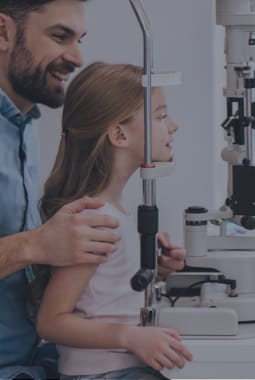When you come to see us, we’ll first sit down and chat about your current general health. Let us know about any medications you are currently taking or recent developments regarding your overall well-being.
We may also ask you to share some brief family history that may be relevant, or ask if you are currently wearing or need corrective lenses.
One of the most noticeable aspects of your eye health is your vision. If it begins to falter, you may need corrective lenses or surgery to help you see clearly again.
We’ll perform a test with a standard letter chart to assess how well you can see things at a distance.
If we determine that you need vision correction, we’ll use an automated phoropter to see which lens prescription is best for you.
After testing your vision, we will use various tests such as tonometry and retinal imaging to assess the overall health of your eyes. We may dilate your pupils to have a better view of your optic nerve and retina.
We will also test your peripheral vision and eye movement to rule out vision loss or misaligned eyes.













